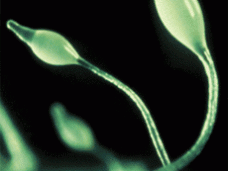For women, the lack of decent public toilets is an emergency. Public conveniences are the final battleground in the sex wars, the ultimate declaration of discrimination. From the latrine to the loo, the pissoir to the powder room, Sally Feldman explores the sexual politics of toilets.
Articles
Read more than 6000 articles in 35 languages from over 90 cultural journals and associates.
MyBrain.net
The colonization of real-time and other trends in Web 2.0
The neurological turn in recent web criticism exploits “the obsession with anything related to the mind, brain and consciousness”. Geert Lovink turns the discussion to the politics of network architecture, exploring connections between the colonization of real-time and the rise of the national web.
You're so cool!
On hardboiled masculinity in Laura Restrepo's "Leopardo al Sol"
Laura Restrepo is one of many contemporary Latin American authors seeking new routes for political writing. Her second novel Leopardo al Sol, about the Columbian drug trade, is an unholy alliance between high and low. Like their 1940s predecessors in the hardboiled crime genre, Restrepo’s women play a minor role, and at the same time are deeply menacing, writes Gabriella Håkansson.
Adorno has often been accused of elitism and ineffectuality, yet his ideas about art and nature gain new relevance as the environmental crisis forces us to rethink how we live. Camilla Flodin explains how Adorno offers an alternative, non-coercive understanding of nature.
The assumption of ownership as an absolute right is largely a creation of the nineteenth century, writes Jean-Claude Monod. Roman law separated abusus, the right to sell, give or destroy property, from usus, the right to make use of it, while medieval custom saw different groups holding complementary claims to the same resource. Today, there are signs of a gradual return to a less deregulated way of looking at our relationship with things.
The metaseminar
Theses on education and the experience of critical thought
After a decade of the Bologna Process, the reforms are a cause more for concern than for celebration. They embody a narrowly utilitarian turn in higher education policy visible not only in Europe but worldwide. In a philosophical critique of the pragmatic reduction of knowledge, Boyan Manchev defines the university as “locus of the unconditionally political”.
As the ideological frenzy of modernism gives way to “content management systems”, and as global megacities render the urban grid and its certainties obsolete, societies of discipline become societies of control. Daniel Miller cracks open the password protected “post-city”.
Ukrainian democracy is allegedly back to square one after Viktor Yanukovych’s election victory. Though reform will not take place as long as political infighting continues, Yanukovych is equally unlikely to drop the European rhetoric and defer to Moscow, writes Mykola Riabchuk. Ukraine’s leadership will continue to “muddle through” – for the time being.
Janez Potocnik, head of the Slovenian negotiating team during the country’s EU accesssion and as from February 2010 European Commissioner for the Environment, explains why a European perspective for the Balkan countries is essential for Europe as a whole, and the role of Sarajevo Notebook in cultivating dialogue in the region.
The lady anatomist
Interview with Sue Black
“Sometimes we forget that maybe we need to ask more questions about the situation we are getting into. Then we have the right to say no.” In 1999, forensic anthropologist Sue Black joined a British UN Forensic Team investigating mass graves in Kosovo, and has since been to Sierra Leone and Iraq. She talks to the journal Intellectum about how she came to work in warzones, and why, despite everything, she loves what she does.
Postmodernist historians of everyday life in totalitarian societies have underrated the role of ideology at the individual level, preferring a performative reading of subjectivity. Yet this fails to explain why the Soviet and Nazi regimes generated absolute commitment, writes Jochen Hellbeck. What is needed, he argues, is an understanding of how ideology is generated in individual acts of appropriation and self-becoming.
An Albanian girl is caught between the patriarchal cruelty of village life and the communist assault on traditional values. She flees to Tuzla in Bosnia, in the hope of finding the freedom to live as a woman denied her by the custom of “sworn virginity”.

In the emergent “panspectric” order, human society is seen in terms of “information traffic”. It is not the actions of individuals that are observed, as in the Foulcauldian panopticon, rather those of the mass. Degrees of corporate and state surveillance are unprecedented; yet panspectric subjectivity also brings new forms of resistance.
“To say that reason is only desiccating and too dry is a dangerous caricature. No less dangerous is to eliminate the place for arts, for myth, which is a different kind of knowledge of the world. We have to be cautious about both dangers, both reductions.” On the publication of his new book In Defence of the Enlightenment, Tzvetan Todorov tells British philosopher AC Grayling why the Enlightenment must be separated from scientism and cultural chauvinism.
The few regulatory measures introduced since the financial collapse in 2008 are being supervised by the same banking sector that caused it in the first place, writes Financial Times journalist Lucas Zeise. Governments’ delegation of regulatory responsibilities has deeply negative implications for democracy.